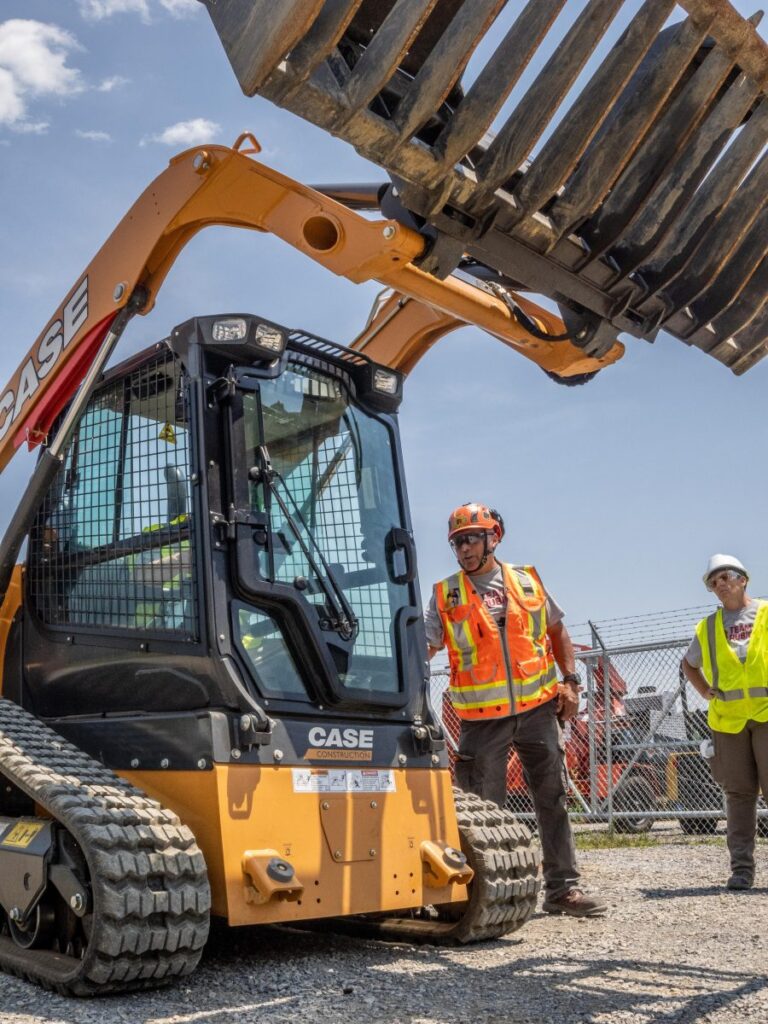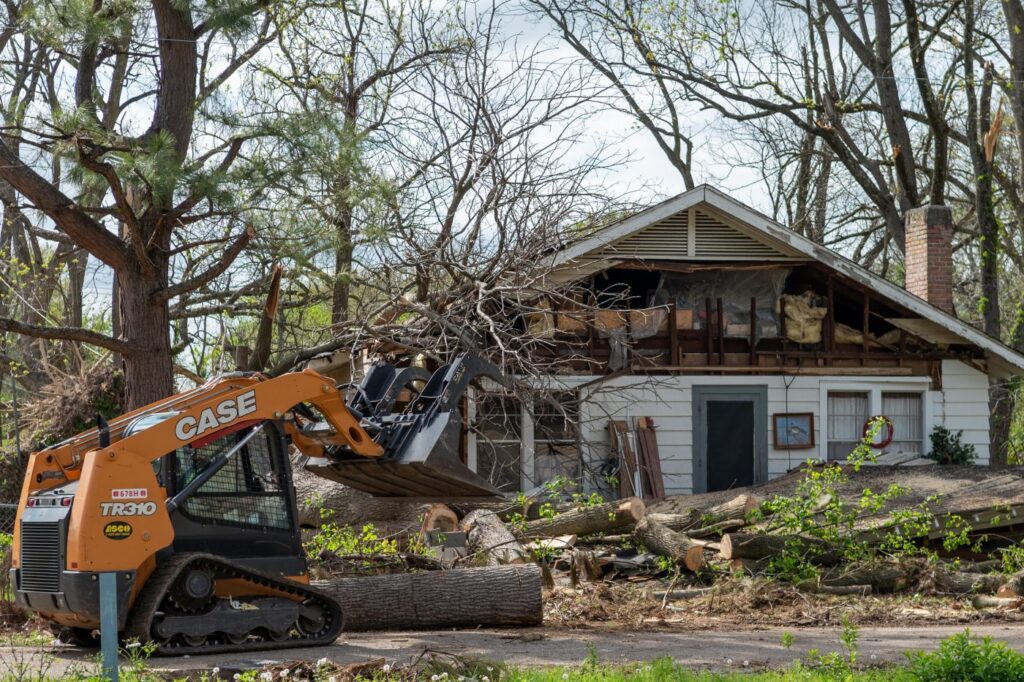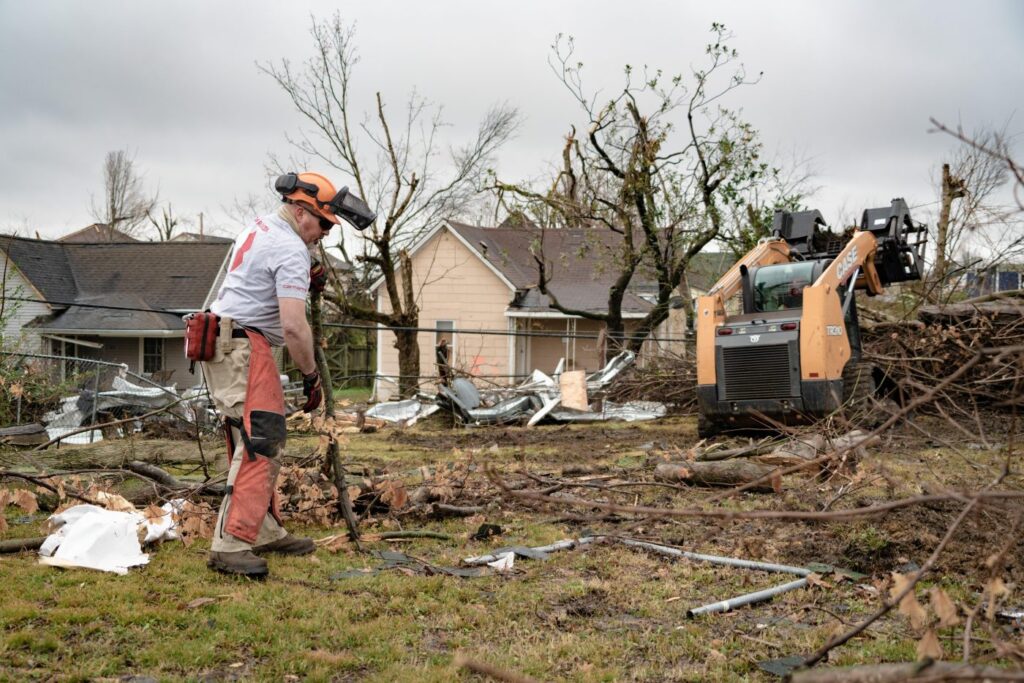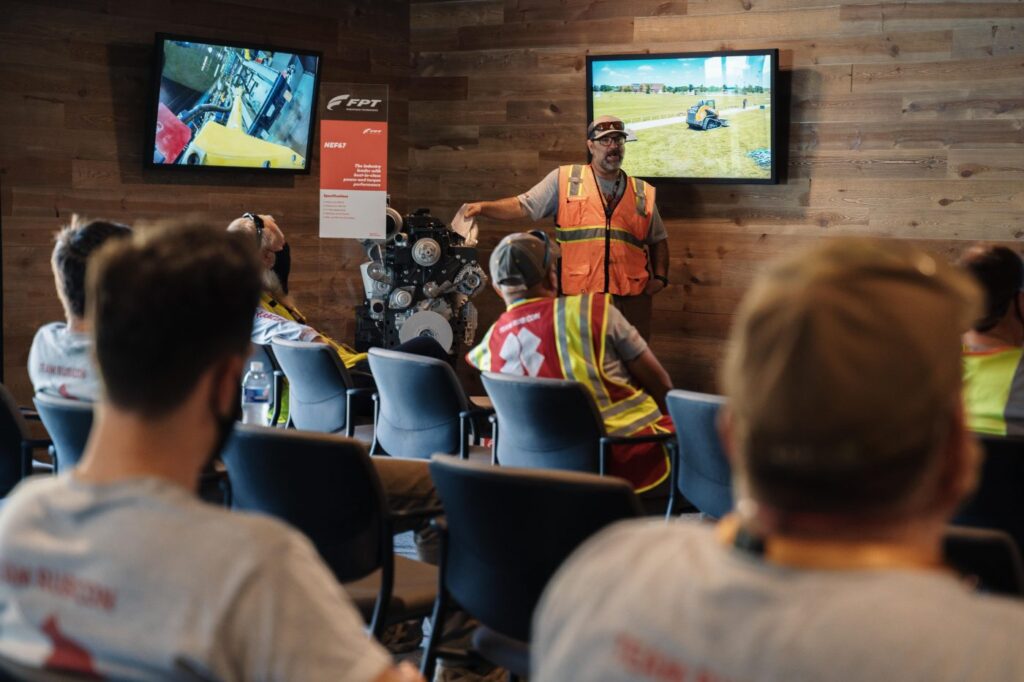It’s a sticky summer day in Franklin, IN, and seven men and women decked out in grey shirts are swarming around a compact track loader, taking notes. All are here, at Case dealership RPM Machinery, for the first in a series of intensive trainings on the use of heavy equipment in the days and hours after a disaster. The goal: to have more trained heavy equipment operators in more places around the U.S. table to put boots on the ground quickly in the hours and days after a hurricane, tornado, or flood.
More volunteer boots on the ground that is. Every one of the men and women in this heavy equipment operator training for the weekend is a Team Rubicon volunteer—or Greyshirt. The trainings are part of a larger partnership between Team Rubicon and Case Construction Equipment, which has been loaning the veteran-led disaster response nonprofit heavy equipment for use in the immediate aftermath of severe storms since 2015. After Hurricane Ian hit Florida in 2022, for example, Team Rubicon used such heavy equipment to clear debris and obstructions on roadways, allowing access for first responders and survivors.

“One of the most critical tasks after disasters strike is being able to get much-needed resources to that area. Our Greyshirts, including sawyers and heavy equipment operators, help clear trees and debris from roads allowing first responders and survivors to regain access to the community,” explains Team Rubicon’s Director of Operations Support, William Porter.
To create more of those qualified HEO Greyshirts, Team Rubicon launched these weekend-long heavy equipment operator training academies at several Case dealerships across the U.S. earlier this year. Team Rubicon brings the expertise on heavy equipment use in disaster zones from their work; the Case dealers provide indoor classrooms, an outdoor operating space, and the machines for the Greyshirts to train on.
The academies are just the initial training phase in Team Rubicon’s HEO training program, but they are allowing the organization to build up skill among new heavy equipment operators as well as help keep already-trained HEO Greyshirts up to speed. Over the weekend in Indiana, the seven students completed HEO1 Initial Safety Training, HEO1 Proficiency Training, and Excavator/Demolition Training. There was also one HEO3 assessment—certifying one experienced Greyshirt to the organization’s highest level of HEO.

“Having more trained heavy equipment operators increases the capacity of Team Rubicon to provide this essential assistance for communities, allowing survivors to move toward the path to recovery,” says Porter.
Some of these trainees come with a bit of heavy equipment operation experience, garnered over years on a farm, for example, or on the job. Most, however, are new to heavy equipment operation. Each seems to have a passion to serve and a drive to find other ways to help individuals on what is likely their worst day—after a flood, a hurricane, or a tornado, for example.
Doing that safely, efficiently, and with exceptionally well-maintained equipment may be just as important, says Greyshirt and Heavy Equipment Senior Associate Patrick Wright. That’s because such essential equipment is being operated in, and moved around, very austere environments—places like Mayfield, KY, and Selma, AL, which were hit by severe tornadoes in 2022 and 2023, respectively. In Graves County, KY, heavy equipment operators helped remove more than 735,800 cubic feet of debris in the weeks after the December ’22 tornadoes; in Selma, AL, they removed more than 247,400 cubic feet of debris and also demolished 22 homes.
That this heavy equipment is so crucial to Team Rubicon—because every skid steer that goes into a disaster zone is there to lift some heavy burdens—is a big part of why Team Rubicon and Case launched the weekend HEO academies.

Currently, Team Rubicon offers the HEO introductory training academies three weekends a month: on-site at Team Rubicon in Alvarado, TX, the first full weekend of the month; at Lawrence Equipment in Roanoke, VA, the second full weekend of the month, and at RPM Machinery in Franklin, IN, the third weekend of each month. Any Greyshirt who has completed Team Rubicon’s online Heavy Equipment Operator Safety Pre-Course can attend any weekend training academy that is within 450 miles of their home. Once a Greyshirt has passed a weekend academy, they are invited to attend one of Team Rubicon’s weeklong Disaster Training Camps, where each student participates in a simulated operation and gets certified to work as an HEO in the field.
The added benefit of conducting the hyper-local heavy equipment operator trainings at Case dealerships is that they also build more resilient local communities. Knowing that it has highly-trained heavy equipment operators on the ground within an hour’s drive of a disaster can mean the difference between rapidly ramping up a team to clear routes for emergency responders and more and a longer wait.
“The more operators that we create within those communities, the more operators we have to deploy if they’re needed within those communities,” says Wright.
Already this year, Team Rubicon has conducted the entry-level training for 37 new HEOs and anticipates training 30 or so more. That means that before year’s end, there could be more boots on the ground and behind the controls of a compact track loader, in a disaster zone, than ever before.




